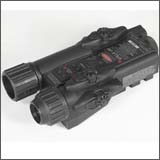 A recently filed criminal complaint accuses a former U.S. soldier of using eBay to export military items he obtained while serving in Iraq. Specifically, the defendant is accused of the unlicensed export of an Atilla-200 laser aiming device to Japan. The complaint details communications between eBay and the defendant which suggests that eBay tipped off federal investigators as to the export of the Atilla-200. As is often the case with criminal export prosecutions, the central issue in the case is whether the defendant had criminal intent since there seems to be little doubt that the export occurred and that no license was obtained.
A recently filed criminal complaint accuses a former U.S. soldier of using eBay to export military items he obtained while serving in Iraq. Specifically, the defendant is accused of the unlicensed export of an Atilla-200 laser aiming device to Japan. The complaint details communications between eBay and the defendant which suggests that eBay tipped off federal investigators as to the export of the Atilla-200. As is often the case with criminal export prosecutions, the central issue in the case is whether the defendant had criminal intent since there seems to be little doubt that the export occurred and that no license was obtained.
The criminal complaint details three interviews between law enforcement and the defendant. In the first interview, conducted when the defendant was entering the United States through the Miami airport, the defendant allegedly admitted that he had stolen the item in question while serving in Iraq, but denied any knowledge of the International Traffic in Arms Regulations (“ITAR”) or its restrictions on the export of defense articles. In a second interview, conducted ten days later at the defendant’s home, he again admitted taking the item while on duty in Iraq. When asked why he had described the item in shipping documents as “used camera lens (optic),” he said that he did that as a result of instructions from the buyer and not because he was aware of ITAR restrictions on exporting the item.
Subsequently, the agents were given emails from the defendant’s Gmail account. One of these read as follows:
Sir,
Sorry late, I alrady [sic] payment.
Please check your paypal account
This
is ITAR itme[sic],If you ship,Please do not write AN PVS-14/7B or ATILLA-200
If you write invoice ex.car engine parts or car electronic parts ($100-$120)
In a third interview, conducted by telephone, the agent pointed out that the email quoted above mentioned that the ATILLA-200 was an ITAR item and instructed him to falsify the shipping documents. The defendant, according to the criminal complaint, continued to deny “that he knew what ITAR meant” and said that he had been truthful in prior interviews.
One semi-literate email from the Japanese purchaser seems a narrow thread on which to hang the required element of scienter, namely, that the defendant knew that the export was illegal. Certainly the defendant would have had a motivation to alter the shipping documents since he clearly knew that he had come into possession of the item illegally. But whether the email’s single reference to “ITAR itme” should have sent the defendant off to Wikipedia prior to shipping the item seems doubtful at best. It is equally reasonable to suppose that the defendant believed that ITAR was a garbled misspelling for some other word or was a Japanese term or any of a number of other possibilities. Indeed, if the defendant was dumb enough to list the item on eBay, it is not hard to imagine that he had no clue what the ITAR was or that the items required an export license.
 Permalink
Permalink
Copyright © 2012 Clif Burns. All Rights Reserved.
(No republication, syndication or use permitted without my consent.)

 Posted by
Posted by  Category:
Category: 

